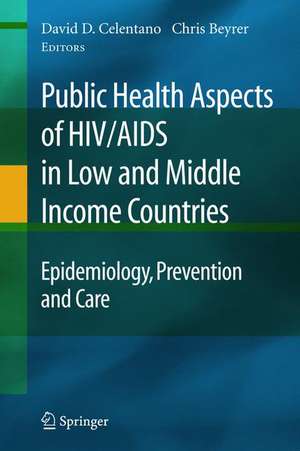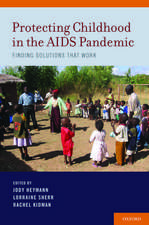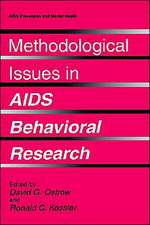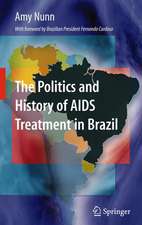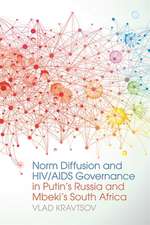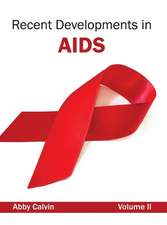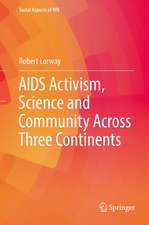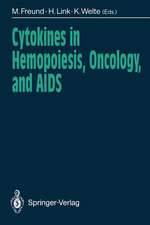Public Health Aspects of HIV/AIDS in Low and Middle Income Countries: Epidemiology, Prevention and Care
Editat de David Celentano, Chris Beyreren Limba Engleză Hardback – 12 sep 2008
This edited volume seeks to systematically describe the emergence and form of the epidemics (epidemiology), the social, community and political response, and the various measures to confront and control the epidemic, with varying levels of success. Of particular importance are strategies that appear to have been useful in ameliorating the epidemic, while contrasting the situation in a neighboring country or region where contrasting prevention or care initiatives have had a deleterious outcome. Common to all responses has been the international multi-sectoral response represented by the Global Fund for HIV/AIDS, Malaria and Tuberculosis, the President's Emergency Plan for AIDS Relief, and the Gates Foundation, among others, to promote HIV pharmacologic therapy in resource-poor settings. The chapter authors will explorethe political challenges in meeting HIV/AIDS prevention and care in concert with the public health realities in specific country and regional context.
| Toate formatele și edițiile | Preț | Express |
|---|---|---|
| Paperback (1) | 815.35 lei 6-8 săpt. | |
| Springer – 29 oct 2010 | 815.35 lei 6-8 săpt. | |
| Hardback (1) | 1137.78 lei 6-8 săpt. | |
| Springer – 12 sep 2008 | 1137.78 lei 6-8 săpt. |
Preț: 1137.78 lei
Preț vechi: 1197.66 lei
-5% Nou
Puncte Express: 1707
Preț estimativ în valută:
217.71€ • 227.92$ • 180.14£
217.71€ • 227.92$ • 180.14£
Carte tipărită la comandă
Livrare economică 05-19 aprilie
Preluare comenzi: 021 569.72.76
Specificații
ISBN-13: 9780387727103
ISBN-10: 0387727108
Pagini: 754
Ilustrații: XXII, 754 p.
Dimensiuni: 178 x 254 x 38 mm
Greutate: 1.5 kg
Ediția:2009
Editura: Springer
Colecția Springer
Locul publicării:New York, NY, United States
ISBN-10: 0387727108
Pagini: 754
Ilustrații: XXII, 754 p.
Dimensiuni: 178 x 254 x 38 mm
Greutate: 1.5 kg
Ediția:2009
Editura: Springer
Colecția Springer
Locul publicării:New York, NY, United States
Public țintă
ResearchCuprins
Epidemiology of HIV/AIDS in Low and Middle Income Countries: Where Global AIDS is and Where it is Going.- HIV Prevention Needs: Primary Prevention and Prevention for People Living with HIV/AIDS.- Future of HIV/AIDS Care in Low- and Middle- Income Countries.- HIV/AIDS Care: The Minimum Package and Scaling Up.- HIV/AIDS Vaccine Research.- Microbicide Development.- How the Pandemic Shapes the Public Health Response – the Case of HIV/AIDS in Brazil.- Advocacy, Activism, Community and the AIDS Response in Africa.- Political Challenges to Mounting and Sustaining a Public Health Response to HIV/AIDS in Developing Countries.- Sub-Saharan Africa.- The HIV/AIDS Epidemics of Africa.- The Situation in the Cradle of AIDS: Congo and Central Africa.- Public Health Aspects of HIV/AIDS – Nigeria and West Africa.- East Africa – Kenya, Tanzania & Uganda.- Southern Africa (South Africa, Botswana, Lesotho, Malawi, Mozambique, Namibia, Swaziland, Zambia, Zimbabwe).- HIV/AIDS in the Horn of Africa.- South and Southeast Asia.- HIV/AIDS in South and Southeast Asia: An Overview.- China.- The HIV/AIDS Epidemic in Thailand – The First Two Decades.- HIV AIDS in Burma: Public Health Constrained.- The HIV Epidemic in Vietnam: Past, Present, and Opportunities.- Malaysia.- Towards Equitable and Quality HIV Prevention and Care Services: Assessing the Situation in India.- Eastern Europe & Central Asia.- The HIV/AIDS Epidemics in the Former Soviet Union, Central Asia, and Iran.- Russian Federation.- HIV in Central Asia: Tajikistan, Uzbekistan and Kyrgyzstan.- Drug Abuse and HIV Transmission in Iran—Responding to the Public Health Challenges.- Latin American and Caribbean.- The HIV/AIDS Epidemics of the Americas.- Epidemiology, Prevention and Care of HIV in Peru.- AIDS in Brazil: The Challengeand the Response.- The State of HIV/AIDS in the Dominican Republic: Guarded Optimism amidst Sustainability Concerns.- Public Health Aspects of HIV/AIDS in Haiti: Epidemiology, Prevention and Care.- HIV/AIDS Prevention, Treatment and Care: Present Status, Future Needs and Some Possible Solutions.
Recenzii
"... A scientifically based account of the current global situation is needed to guide opinion leaders and decision makers in different sectors of society, as well as all those people engaged in activities against HIV/AIDS. ... Public Health Aspects of HIV/AIDS in Low and Middle Income Countries offers just such an account, with the help of many contributors with expert knowledge of the affected countries. The value of the book lies partly in the comprehensive presentation in one volume of up-todate and wide-ranging knowledge and also in its impartiality, since it might be perceived to be more independent than official publications by the UN or governments." -Lars O Kallings, The Lancet, Vol 372
"'Why is the world’s response to AIDS failing?' Public Health Aspects of HIV/AIDS in Low and Middle Income Countries will be an outstanding resource for students, researchers, and public health and medical professionals seeking answers to this crucial question. The book both instructs and challenges readers to learn from the first 25 years of the HIV pandemic and to use this knowledge to shape its future." -R. Scott McClelland, MD, MPH, JAMA, August 5, 2009, Vol 302, No. 5
"'Why is the world’s response to AIDS failing?' Public Health Aspects of HIV/AIDS in Low and Middle Income Countries will be an outstanding resource for students, researchers, and public health and medical professionals seeking answers to this crucial question. The book both instructs and challenges readers to learn from the first 25 years of the HIV pandemic and to use this knowledge to shape its future." -R. Scott McClelland, MD, MPH, JAMA, August 5, 2009, Vol 302, No. 5
Notă biografică
David D. Celentano is a Professor in the Department of Epidemiology and Director of the Infectious Diseases Epidemiology Program at the Johns Hopkins Bloomberg School of Public Health. His research integrates behavioral science theory and research with epidemiology, in the study of behavioral and social epidemiology. Celentano is the Principal Investigator of four NIH-supported studies in Thailand, focusing on interventions to influence the association between opiate use, methamphetamine use, and other drugs on HIV.
Chris Beyrer is Associate Professor in the Department of Epidemiology at the Johns Hopkins Bloomberg School of Public Health. He is also the Founder and Director of the Center for Public Health and Human Rights at Johns Hopkins. He is a co-editor of Public Health and Human Rights: Evidence-Based Approaches, to be published in 2006 by Johns Hopkins University Press.
Chris Beyrer is Associate Professor in the Department of Epidemiology at the Johns Hopkins Bloomberg School of Public Health. He is also the Founder and Director of the Center for Public Health and Human Rights at Johns Hopkins. He is a co-editor of Public Health and Human Rights: Evidence-Based Approaches, to be published in 2006 by Johns Hopkins University Press.
Textul de pe ultima copertă
Public Health Aspects of HIV/AIDS in Low and Middle Income Countries
Epidemiology, Prevention, and Care
Edited by David D. Celentano and Chris Beyrer, Johns Hopkins Bloomberg School of Public Health
Over the last 25 years, HIV/AIDS has become the world's leading public health concern and an important human rights issue. More than 33 million people are currently infected—and the severest burden of the disease is on the nations with the fewest resources to counter it. Partnerships between high income and low and middle income countries, local and global struggles over prevention, care, and research priorities, and widespread community activism are shaping the public health picture on a global scale.
Public Health Aspects of HIV/AIDS in Low and Middle Income Countries brings a comprehensive world context to the pandemic, tracking epidemiological trends, correcting misperceptions, and examining the impact of local, government, and international responses in countries as disparate as Brazil, Nigeria, the Russian Federation, and India. A top panel of local and regional experts offers the latest data on infection rates, details on risk-reduction and care programs, analysis of evolving social attitudes regarding HIV, and prospects for new initiatives in prevention and treatment.
Key features of the book:
Epidemiology, Prevention, and Care
Edited by David D. Celentano and Chris Beyrer, Johns Hopkins Bloomberg School of Public Health
Over the last 25 years, HIV/AIDS has become the world's leading public health concern and an important human rights issue. More than 33 million people are currently infected—and the severest burden of the disease is on the nations with the fewest resources to counter it. Partnerships between high income and low and middle income countries, local and global struggles over prevention, care, and research priorities, and widespread community activism are shaping the public health picture on a global scale.
Public Health Aspects of HIV/AIDS in Low and Middle Income Countries brings a comprehensive world context to the pandemic, tracking epidemiological trends, correcting misperceptions, and examining the impact of local, government, and international responses in countries as disparate as Brazil, Nigeria, the Russian Federation, and India. A top panel of local and regional experts offers the latest data on infection rates, details on risk-reduction and care programs, analysis of evolving social attitudes regarding HIV, and prospects for new initiatives in prevention and treatment.
Key features of the book:
- A region-by-region guide to the state of the epidemic and its impact on societies, comparing responses and success rates across affected countries.
- Separate chapters reviewing epidemiology, treatment, prevention, and advocacy in specific countries and regions within Sub-Saharan Africa, South and Southeast Asia, Central Asia/Eastern Europe, Latin America, and the Caribbean.
- Global Fund, PEPFAR, and a host of other responses: coverage of the basic package and "scale-up" in HIV/AIDS care.
- Overview of obstacles to access to care and prevention, and the rise of community groups andactivist movements to meet these challenges.
- Reports on the current status of antiretroviral therapies, vaccine research, and microbicide development.
Caracteristici
Organized by region, compares approaches across countries Contributors are local experts on HIV/AIDS prevention Includes supplementary material: sn.pub/extras
